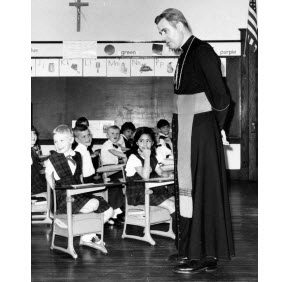Bishop F. Joseph Gossman, a former auxiliary bishop of Baltimore who served as the archdiocese’s first urban vicar, died Aug. 12 following a long illness. The retired bishop of Raleigh, N.C., was 83 and had been well known for his leadership on social justice issues.
“He was very good at welcoming people,” said Father Alphonse Rose, a seminary classmate and longtime friend.
Noting that Bishop Gossman became a bishop in 1968, the same year as the Baltimore Riot, Father Rose said the young bishop, who was only 38 at the time of his elevation, was a healing presence who was regarded as a “friend to everyone.”
“Those were very difficult days,” said Father Rose, former pastor of St. Margaret in Bel Air. “He was open to everyone and really committed to the church. He was also very good at welcoming people of other races into the diaconate.”
Born in Baltimore and raised in Shrine of the Little Flower Parish, Bishop Gossman was ordained in 1955 after studies at St. Charles College, Catonsville; St. Mary’s Seminary in Roland Park and the Pontifical North American College in Rome. He earned a doctorate in canon law at The Catholic University of America in Washington, D.C.<
He served as assistant pastor of the Basilica of the National Shrine of the Assumption of the Blessed Virgin Mary, Baltimore, before being appointed vice chancellor and a tribunal judge for the archdiocese. He also was a professor at St. Mary’s Seminary and administrator of the Cathedral of Mary Our Queen, Homeland. He worked very closely with Cardinal Lawrence Shehan whom he regarded as a mentor
He was named a Baltimore auxiliary bishop in 1968, serving in that role until he was transferred to Raleigh in 1975.
When Archbishop William D. Borders established the vicariate administrative system in Baltimore, he appointed Bishop Gossman the first urban vicar, responsible for leadership in Baltimore City.
As urban vicar, Bishop Gossman personally attended meetings related to the clustering of city schools, even though he knew he would face harsh criticism. According to an April 11, 1975, story in the Catholic Review, he was often jeered and booed by parishioners opposed to the plan.
Bishop Gossman was the first U.S. bishop to be ordained in the new, simplified ceremony for the ordination of a bishop, which had just received Vatican approval for use in the United States on an experimental basis as part of the liturgical reforms following the Second Vatican Council.
In place of the traditional banquet honoring a newly ordained bishop, he celebrated his ordination with a simple buffet and reception and had the money that would have been spent on a banquet sent for aid to Biafra, a short-lived secessionist state of Nigeria, which was then in the midst of a destructive civil war and faced massive humanitarian needs.
“He was highly intelligent,” Father Rose said. “He was at the top of our class at the seminary.”
Monsignor William Burke, pastor of St. Francis of Assisi in Baltimore, remembered Bishop Gossman as a pastoral leader.
“He brought people together to share concerns,” Monsignor Burke said. “It was a heady time.”
As the fourth bishop of Raleigh, Bishop Gossman oversaw a diocese that grew rapidly under his leadership. According to the diocese, he blessed and dedicated more than 60 parishes, schools and buildings. He often spoke out on the plight of the poor and was a strong opponent of capital punishment.
He was a leader in the creation of the North Carolina Lutheran-Roman Catholic Covenant that was signed in 1991 by the Dioceses of Raleigh and Charlotte and the North Carolina Synod of the Evangelical Lutheran Church in America.
The funeral Mass for Bishop Gossman will be celebrated Aug. 20 at St. Michael the Archangel Catholic Church in Cary, N.C., followed by internment at Our Lady of Guadalupe Cemetery in Newton Grove, N.C.
Raleigh Bishop Michael F. Burbidge, who succeeded Bishop Gossman in 2006, asked all in the diocese to join him “in praying for the eternal happiness of Bishop Gossman and to thank God for the gifts of his priestly example and faithful ministry as bishop.”
In a letter to the priests of the Baltimore archdiocese, Archbishop William E. Lori encouraged prayers for the repose of Bishop Gossman’s soul and noted that the bishop was guided by his episcopal motto: “To serve, not be served.”
“His priestly example and his efforts to promote the church, most especially in Baltimore City, continue to bear fruit and are a welcome example to all of us who are called to serve the Lord and his people.”
Email George Matysek at gmatysek@CatholicReview.org
Catholic News Service contributed to this story.

